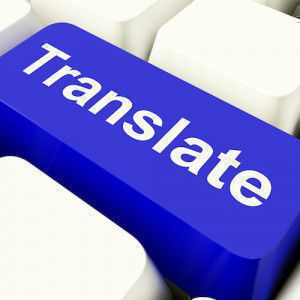Do you know who you’re talking to?
Our post today is by Izabella Klein, who’s been working with us to translate our maths apps into Brazilian Portuguese. Izabella’s post is about the importance of getting to know your target audience as a translator, and understanding more than just the words used.
Have you ever read an article, document or webpage in your own language that you can clearly see has been translated from another language? The sentences don’t really make sense, or have wordings that are not commonly used where you come from or where it’s been published. Do you get bored or lose interest because of this? I would say most likely yes!
There are two main reasons for this. One, it has been translated by a translation device. Or two, it has been translated by real people, but they were not careful to take into consideration the target public – you.
Reason number one I will disregard, because I strongly do not recommend this option for translation. But let’s go a bit deeper into reason number two, and look at why many translations are not handled carefully, to catch the attention of the readers, or even just make them understandable.
Let’s take the English language as an example. How many different countries in the world speak English as a first language? USA, England, Australia, some of Canada, some of Africa and even more. But, although it is all English, each one of them has a particular way of communicating; they use different words, they have different local parlance, slang and so on. Spanish is another language spoken worldwide as a first language; take Spain, Argentina, Colombia, Mexico, Chile, Peru, Venezuela and Ecuador for example. And even if we talk specifically about Spain, they still have other variations, such as Catalan and Galician.
So, even if someone is fluent in a specific language, that doesn’t mean they are capable of translating perfectly to that language in any place in the world where this is the native language. You must understand the minimum of their culture, their slang, and how they usually communicate something that you are interested in communicating to them.
I’ll take myself as an example. I’ve been working for Japanese people for the last couple of years as a linguist, using Portuguese and English as source and target languages. In the beginning it was a hard task. Much of what was said or written to me was difficult to understand: their awkward accent, the different words they used (words that are in the dictionary, but I’d never really heard people saying them on a daily basis), or incomplete sentences. So I had to get used to their weird English sentences, sometimes just random words that I had to put together like a puzzle and figure out the missing words. But, in the end, it was just a matter of adapting to their culture, or to JapanEnglish as I call it. Now, I feel 100% confident while working with them. I had to spend a year studing their different habits, and basically dig a way into making myself understandable in their language, in this case JapanEnglish.
You might say JapanEnglish is not really a language, but I argue that it is. It’s just a mixture of Japanese and English, the same way Catalan is a mixture of Spanish and French; and Galician a mixture of Spanish and Portuguese. The only difference is JapanEnglish is not an official language. My point here is that it’s important to realise why you must get to know your target public as deeply as possible, so that your translation work will be accurate.
I can also take my internship at EuroTalk as a second example of my work experience. I worked in app localisation, focused on teaching maths to very young children. Some might say it must have been an easy task. But actually it was not that easy. Children are different from adults, they use different vocabulary and they can easily get distracted. Plus, you can’t use a completely different vocabulary than teachers use at school, because the main idea is to reinforce what they will learn or are already learning at school; otherwise you might just confuse them, which will mean unhappy children and parents.
I know that for most linguists time is money, as it is for most people, but a piece of advice from what I have learned during my career is, take some time and effort to study your market. I believe that if you do, your chances of boosting your career are greater.
Izabella
Something Borrowed: when one language just isn’t enough
After reading Konstantia’s post a few months ago about how many of our everyday words come from Greek, I started to think about where some of our other words came from. You might think that we are the ones influencing everyone else (words such as wifi in French, surfear for surfing the net in Spanish, and a lot of business jargon in German – downloaden, ein Workshop, ein Meeting and so on…), and of course that’s true. Most new inventions (the Internet, computers and related tech such as wifi) are named by Americans, and therefore the English word is often passed along to other cultures and absorbed into their languages. You’ll also find many non-English speakers throwing in English phrases amidst their native tongue. Any other Borgen fans will probably have noticed the way that characters casually use phrases such as ‘on a need to know basis’ whilst otherwise conversing in Danish. Clearly our language, especially in the business, IT and entertainment domains, has a huge global influence.
 However, if you look a little further back, you’ll find us doing exactly the same thing. It might seem incredibly cool to Europeans now to use English or merely ‘English-sounding’ words day to day, but we’re just as guilty of language-envy or just pure laziness with French, especially. How to describe that annoying feeling of being sure you’ve already seen or done something? Déjà vu, of course. Not to mention dozens of other words and phrases we all use on a daily or regular basis: laissez faire, enfant terrible, a la carte, a la mode, arte nouveau, en route, faux pas… I could go on for pages. You’d probably struggle to go through a day without using at least one or two obviously French words. It’s almost as if we simply couldn’t be bothered to think of our own words for some of these things, although I also suspect it has a lot to do with our associations with French as chic (another one!) and sexy. This is especially true in the beauty industry, which explains the proliferation of products labelled visage or with names like touche eclat remaining in their original alluring French guise.
However, if you look a little further back, you’ll find us doing exactly the same thing. It might seem incredibly cool to Europeans now to use English or merely ‘English-sounding’ words day to day, but we’re just as guilty of language-envy or just pure laziness with French, especially. How to describe that annoying feeling of being sure you’ve already seen or done something? Déjà vu, of course. Not to mention dozens of other words and phrases we all use on a daily or regular basis: laissez faire, enfant terrible, a la carte, a la mode, arte nouveau, en route, faux pas… I could go on for pages. You’d probably struggle to go through a day without using at least one or two obviously French words. It’s almost as if we simply couldn’t be bothered to think of our own words for some of these things, although I also suspect it has a lot to do with our associations with French as chic (another one!) and sexy. This is especially true in the beauty industry, which explains the proliferation of products labelled visage or with names like touche eclat remaining in their original alluring French guise.
French is the best example, as they are our nearest geographical neighbours, and historically one of our closest political connections, which explains the huge interconnection of our languages. However, as soon as you think about it, there are hundreds of other words that have crept into our parlance from other languages. Words like Zeitgeist and one of my favourites Schadenfreude have come over from German, whilst our food vocabulary owes a lot to Spanish (salsa, jalapeno, tortilla, nacho, paella…) We’re also becoming ever more familiar with words and especially foods from China and Japan. Sushi, sake, kimono, karate, karaoke and so on are everyday words to us, whilst we happily order bok choy, chop suey and chow mein without even thinking about it, not to mention concepts like yen, zen and feng shui. Taekwondo has made its way over from Korea, whilst we’ve taken words like bamboo and paddy from Malay.
This is just a quick look at some of the more obvious ways that our language has spread globally, and how many words we have absorbed from nearby European countries, but also from more distant Asian cultures. We’re such a global country, and it’s strongly reflected in our language. We’d love to hear more examples of English words creeping into other languages or other foreign words you’ve noticed in English, so feel free to leave a comment below!
Alex
What’s the hardest language to learn?
I remember the first day of my Hispanic Studies degree, when our head of department brought us all down to earth by reminding us that Spanish is one of the easiest languages to learn. Having all worked pretty hard to get there, we were quite offended, but looking back now, I have to admit he may have been right… Spanish follows relatively simple grammatical rules, and once you know the different sounds, you can look at any word, and even if you’ve never seen it before you’ll know how to pronounce it. Of course there are areas of difficulty, like the age-old ‘ser or estar’ debate and (every linguist’s favourite) the subjunctive, but on the whole it isn’t a nightmare to get to grips with.
So that got me thinking: what is the hardest language to learn? Obvious answers that spring to mind are languages like Arabic, Mandarin, Cantonese and Japanese, which use a completely different writing system to English and, in the case of the Chinese languages, rely heavily on tone of voice. Changing the way you say a word even fractionally can completely change its meaning – which makes learning the language seem pretty daunting.
Other languages that I’ve been told are really difficult to learn include Finnish and Hungarian, in this case because of their complicated grammar systems.
Of course this is all from an English speaker’s point of view. If I’d been brought up speaking another language then my ideas about which are most difficult would probably be totally different. I’m sure I’d find English quite hard if I weren’t a native speaker.
What do you think? Have you ever learnt a language that was particularly challenging?
Liz

